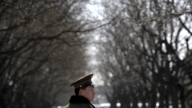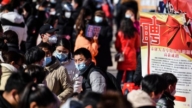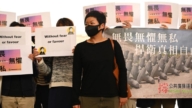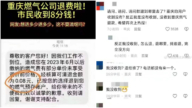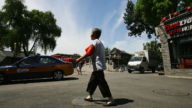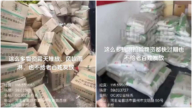【新唐人2012年8月27日讯】中国大陆出口增长显着放缓的同时,中共国务院总理温家宝日前到广东省进行考察,他指出,下半年经济“稳增长”的难度较大,而敦促广东要“千方百计稳定外需”。有经济学者认为,“稳定外需”没有可行性,当局对目前中国经济下行已经无力回天。
24和25号两天,温家宝在广东省委书记汪洋的陪同下,在广州、佛山和东莞等地,就当前经济走势,特别是稳定外需、加快外贸转型升级进行了调研。
温家宝表示,从广东省的新出口订单指数等先行指标来看,出口仍然面临较多困难和不确定性,实现下半年经济“稳增长”的难度较大。
时事评论专家杰森认为,曾经作为拉动中国经济增长的三驾马车之一的出口,目前已经变成了拖累经济发展的因素。
时事评论专家杰森:“广东那边,像东莞等等这些地方,是中国目前面临的经济问题的核心展现的地方。像东莞这样子的国际工厂的代表性地点,经济几乎是处于无增长的情况。”
资料显示,中国大陆经济增速已经连续5个季度放缓,今年第2季度的GDP增长率更是只有7.6%,是2009年第一季度以来第一次低于8%。踏入7月份后,沿海主要省市的出口增速也明显放缓。
温家宝敦促广东要“千方百计稳定外需”,并强调“稳增长”是中央下半年经济工作重点任务,要进一步加大宏观调控的力度。
对于温家宝要“稳定外需”的提法,北京师范大学MBA导师段绍译感到非常意外,因为外需不可能在调控范围之内。
杰森也认为,出口下滑给中国经济带来了很大压力,不过“稳定外需”没有可操作性,只是形式上为广东省糟糕的经济打打气而已。
杰森:“稳出口也就是接着让出口这辆马车起作用,但是我觉得这个话完全是一个口号性的话,没有具体可执行性。换句话说,可能也展现出温家宝在中国经济目前面临这样的情况的一种回天无力的感觉。”
据《自由亚洲电台》报导,2012年上半年,大陆企业倒闭率从过去的每年3%-5%上升到8%-10%,包括电子、纺织、制衣和玩具等行业。中国作为跨国公司加工工业基地的地位已经开始全面动摇,曾经的经济发展龙头—-珠三角更是面临着制造业大逃离。
最新公布的制造业采购经理指数创下9个月新低,也显示出大陆制造业活动持续处于萎缩状态。
杰森:“中共目前唯一的办法就是用政府消费的形式推动所谓的内需,用政府投资的方式推动所谓的投资,其结果都是资金的低效率使用。因为政府投资是整个资金链最低效率的消费形式,其实已经是变成了像整个一个人将死的时候,整个机体是靠注射营养液让他活下去,维持心跳这样一个状态。本身他自身的动力已经丧失殆尽了。”
近期各地方政府已经开始出台经济刺激计划。据大陆媒体初步统计,在过去的50天里,已经公布的地方投资计划涉及金额大约有7万亿元,远远超出金融危机时的“4万亿”计划。
美国华府中国问题专家石藏山向《大纪元》新闻网指出,中国经济萧条严重已经让当局感到危机,无奈投资刺激成为唯一的选择。不过更大规模的刺激经济,将导致比上次“4万亿”刺激计划更严重的后果,通胀将再次迅速上升。对于中国经济来说,只是“饮鸩止渴”。
采访/刘惠 编辑/李明飞 后制/周天
Beijing Regime Helpless to Tackle China’s Bad Economy
China has seen a significant slump in export growth.
Chinese Communist Party (CCP) Premier Wen Jiabao
recently traveled to inspect Guangdong Province.
Wen Jiabao highlighted the hardship in stabilizing
economic growth for the second half of the year.
Wen has urged Guangdong authorities to “assure
demand from overseas markets by all means”.
Economists have negated the feasibility
of “stabilizing foreign demand”.
They concluded that the CCP regime has been completely
helpless in tackling China’s economic slowdown.
On August 24 and 25, Wen Jiabao, accompanied by
Guangdong CCP Chief Wang Yang, inspected Guangdong.
Wen visited the cities of Guangzhou, Foshan and Dongguan.
He stressed stabilizing overseas market demand and
speeding up of export sector’s structural improvement.
Wen Jiabao said that Guangdong’s new export
orders index revealed a tough export situation.
The goal of “stabilizing economic growth"
in the second half of 2012 would be difficult to achieve, Wen Jiabao claimed.
Critic Jason Ma states that China’s export was one
of the three major engines of economic growth.
However, it has now become a burden
to the country’s economic development.
Jason Ma: “Regions in Guangdong, like Dongguan,
fully embody the current economic problems in China.
These places typically centralize international plants,
but the economic growth is almost zero.”
Public data show that China’s economy has
slowed down for the fifth consecutive quarter.
China’s GDP growth rate during the second quarter of 2012
was only 7.6%, which is the first time below 8% since 2009.
Major coastal provinces and cities have seen
a significant slump in export growth since July.
Wen Jiabao has urged Guangdong CCP authorities to “do
everything possible to stabilize overseas market demand."
Wen said that “stabilizing economic growth”
is the priority in the second half of 2012.
The regime shall tighten macro-economic
regulations, according to Wen.
What Wen Jiabao discussed has surprised Duan Shaoyi,
an MBA mentor at Beijing Normal University.
Duan remarked that demand in overseas
markets is off the radar for the CCP regime.
Jason Ma adds that the decline in export
has put China in a very stressful situation.
It is not feasible to “stabilize overseas purchases”.
Wen’s approach is only a slogan that boosts
morale against Guangdong’s bad economy.
Jason Ma: “Prioritizing export, that is,
making this engine continue to function.
But I think the talk is a pure slogan, without feasibility.
In other words, it may indicate Wen Jiabao’s helpless
feeling in the face of China’s current economy.”
Radio Free Asia reported that in the first half of 2012,
China’s business failure rate rose to 8%~10%
The previous annual figure was 3% ~5%.
The involved sectors include electronics,
textiles, garment and toy manufacturing.
The position of China as a manufacturing base
for multinational companies has become shaky.
The Pearl River Delta, once heading China’s economy,
is now facing a big withdrawal from the manufacturing sector.
The latest PMI hit a nine-month low, showing
that China’s manufacturing continues to shrink.
Jason Ma: “Now the only way for the CCP authorities
is to use government consumption to fuel domestic demand.
To use government investment to promote investment.
All these approaches have inefficiently used money.
In terms of the entire capital chain, government investment
is the least efficient way of consumption.
It is like a dying person who is kept alive by injecting
nutrient solutions to maintain his heartbeat.
But his own energy has been completely lost.”
Local CCP authorities have recently
initiated plans to boost the economy.
China’s media reported that in the last 50 days,
announced investment plans involve about RMB 7 Trillion.
This figure far exceeds the RMB 4 Trillion
used in the financial crisis.
Shi Cangshan, expert on China issues,
commented to The Epoch Times.
The severity of China’s economic slump
has placed the CCP regime into crisis.
However, investment has become the regime’s
only option for an economic stimulus plan.
Shi Cangshan warns there would be a worse aftermath if
more than RMB 4-Trillion is used as an economic stimulus.
Inflation would be once again quickly raised.
Shi Cangshan remarks that for China’s economy, this
approach is equal to “drinking poison to quench thirst”.




